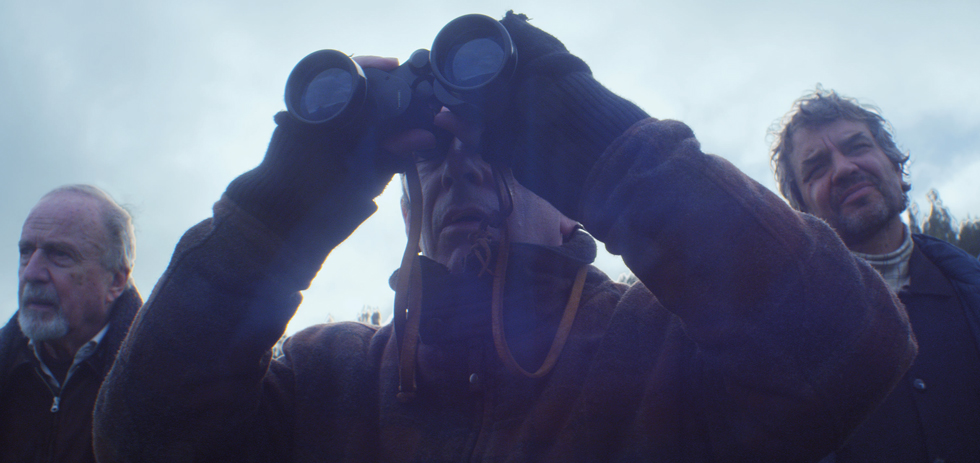
Pablo Larrain’s follow-up to the critically lauded and commercially palatable No is both a step forward and step backwards. Gone are the overt experimentations with aspect ratio, colour and editing; in their place is a remarkably assured bleak character piece that tonally returns to Post Mortem and swaps that film’s more obvious black comedy with a slow-burning and unrelenting cynicism. It would perhaps be too easy to say Larrain, and co-writers Guillermo Calderon and Daniel Villalobos, have just swapped out Pinochet for the Catholic Church, and whilst that former power structure isn’t replicated here there are some clear parallels with regards to authority amidst chaos, it’s less disarming overseer than a force for interpersonal destabilisation.
Even in its title, The Club is something of a sick, drawn-out joke, detailing the happenings of the titular collective, a group of priests who have been banished from the church and are serving out their supposed penance in a house in a seaside town. The reason for banishment in each case varies, but the accusation of child molestation hangs over all, a feeling made more evident upon the arrival of a new priest, Father Lazcano (Jose Soza), and Sandokan (Roberto Farias), a man sexually molested by Lazcano as a child. What’s unsettling and impressive in equal measure is that each of the priests are, in their own right, fully formed characters who wrestle with self-image and the repression of guilt in distinctly different ways; at one stage one of the priests even terms himself the “king of self-repression,” and they seem fully content with their own distorted narratives of moral justification. Larrain regulars Alfredo Castro and Antonia Zegers appear as a Fr. Vidal, who struggles to deal with his own sexual identity as a homosexual, and Sister Mónica, the nun who runs the house, whose own backstory makes for a remarkable commentary on the power of faith as the film hits its climax; both actors are superb here. Alfredo Castro, Jaime Vadell, Alejandro Goic and Alejandro Sieveking round out the rest of the flock of priests, and Marcel Alonso (whose stare is as powerful and intimidating as Fırat Tanış’ in Once Upon a Time in Anatolia) plays Fr. Garcia, a relatively younger priest brought into the house by the Church to force confessions from each of them.
The impetus for their confessions isn’t just as a result of an early shocking event but also the rise of a seemingly new leadership within the Church, who want to break these men and (perhaps) hold their confessions over them as a means of self-preservation; they could be shifted from dependents to the scapegoats for the rampant child sex-abuse claims in Chile. The impact of Garcia, though, is less of a paradigm shift than he would have hoped. Larrain’s focus on power here is the power in faith, the question of whether these priests see any real authority in Garcia is tied to their beliefs. Where once they collectively trained and raced a greyhound, got drunk and wasted away their days, Garcia throws out the alcohol, demands they let the dog loose and is hellbent on forcing confessions from each of them. Coupled with the priests’ reluctance to change (they still see themselves as having the authority of the Church vested in them), the ever-looming presence of Sandokan, the human embodiment of the ignored victims, threatens to derail Garcia’s methodical plan. Whilst the narrative clearly focuses around a group of men, the most nuanced and interesting role is that of Sister Mónica, Zegers investing in her this wonderfully two-faced identity, her role in the house has made her the great protector of these men, rather than the Church.
Sergio Armstrong’s cinematography, whilst less experimental than No, is still alluring, his use of digital video and willingness to play close-up shots of the priests slightly out of focus gives the film an enigmatic feel, a moral mystery married to a oft-unclear visual style. This is paired with a score packed with Bach and Arvo Pärt, the beautiful hymnal music all part of Larrain’s bleakly comic outlook, the music as timeless as the old ways of the Church and the tide that keeps rolling in at the shore.1
Where the film suffers, then, is in its overplotted climax, paradoxically vague in intention and complex in construction. It goes from languid character piece to a swiftly rendered end, though it doesn’t derail the film as much as feel a tad too neat. The fallout of the event, though, is still potent in its evisceration of the Church, repression the defining attribute even as the film concludes. In some respects, then, The Club serves as a foil to last year’s darkly comic Catholicism chamber play, John Michael McDonagh’s Calvary, yet where that film made a point of the power of sacrifice in faith and the distinction between man and the Catholic machine, Pablo Larrain is less kind and more brutally effective, as his characters and their church don’t just avoid the notion of sacrifice, they actively work against it.
Around the Staff
| Brad Mariano | |
| Ian Barr | |
